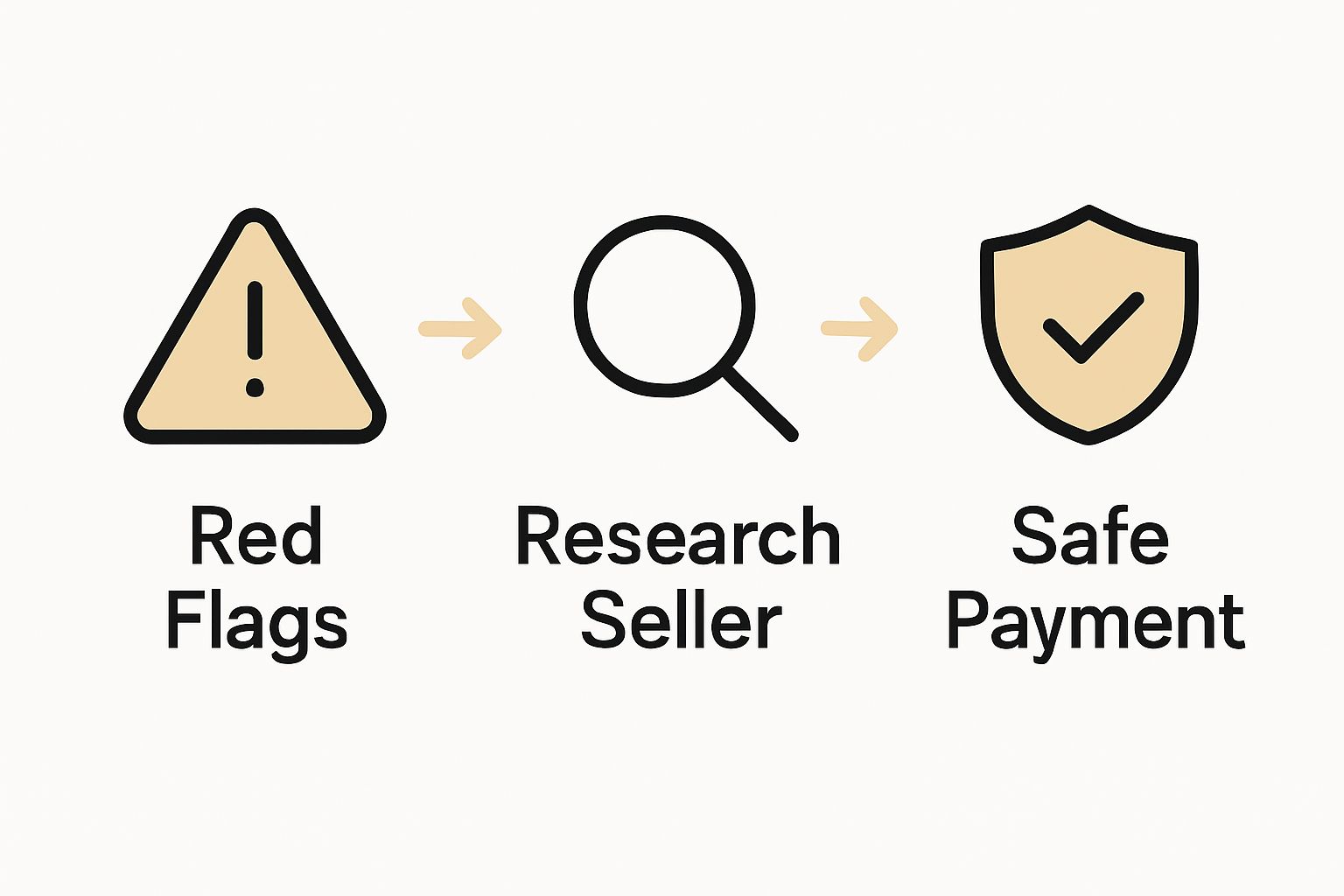Understanding Avoiding Financial Scams in Car Buying
October 8, 2025
Financial scams are everywhere and car buyers are a prime target. Every year, these schemes steal millions of dollars from buyers in the US alone. You might think high tech cyber tricks are the biggest danger. But many scams still use everyday tactics anyone could fall for.
Table of Contents
- What Are Financial Scams And How Do They Occur?
- Why Understanding Financial Scams Matters For Car Buyers
- How Financial Scams Target Buyers In The Car Market
- Recognizing Common Types Of Financial Scams In Car Purchases
- Safeguarding Yourself Against Financial Scams In Car Buying
Quick Summary
| Takeaway | Explanation |
|---|---|
| Understand common scams | Familiarize yourself with the various scams targeting car buyers, such as fake listings and phishing. |
| Conduct thorough research | Verify sellers, vehicle documentation, and ownership histories before making any purchases to avoid fraud. |
| Recognize red flags | Be alert for urgency and deals that seem too good to be true, as these often indicate scams. |
| Utilize secure payment methods | Always use secure payment platforms that offer buyer protection to mitigate financial risks. |
| Use professional inspections | Consider hiring independent services to inspect vehicles to ensure legitimacy before purchase. |
What Are Financial Scams and How Do They Occur?
Financial scams represent sophisticated criminal strategies designed to manipulate unsuspecting individuals into surrendering money, personal information, or valuable assets through deceptive practices. According to the Federal Trade Commission, these scams exploit human psychology, trust, and technological vulnerabilities to achieve fraudulent objectives.
Understanding the Anatomy of Financial Scams
Financial scams operate through carefully constructed mechanisms that target specific psychological triggers. Scammers typically employ complex strategies that make their fraudulent schemes appear legitimate and compelling. These strategies often include:
- Creating a sense of urgency that pressures victims into making rapid decisions
- Impersonating trusted institutions or authority figures
- Leveraging emotional manipulation techniques
- Utilizing sophisticated technological platforms to appear credible
Common Techniques Used in Financial Scams
Scammers deploy multiple sophisticated techniques to deceive potential victims. These methods range from digital manipulation to elaborate social engineering tactics. Key approaches include:
- Phishing emails mimicking official communication
- Fake online marketplaces promising unrealistic deals
- Telephone scams threatening legal consequences
- Investment schemes promising extraordinary returns
Understanding these tactics empowers individuals to recognize potential threats and protect themselves from financial predators. Awareness and skepticism serve as critical defense mechanisms against increasingly complex fraudulent schemes.
Below is a breakdown of common financial scam techniques used in car buying, along with a brief explanation of each approach.
| Technique | Explanation |
|---|---|
| Phishing emails | Messages that mimic official communication to steal data |
| Fake online marketplaces | Fraudulent platforms offering unrealistically low deals |
| Telephone scams | Calls threatening legal action or urgent responses |
| Investment schemes | Promises of extremely high returns to lure victims |
| Fake vehicle listings | Listings with stolen images and false information |
| Counterfeit vehicle documents | Forged papers to dupe buyers about a car’s legitimacy |
| Escrow service fraud | Fake services pretending to hold your money securely |
Why Understanding Financial Scams Matters for Car Buyers
Financial scams targeting car buyers represent a significant threat that can transform what should be an exciting purchase into a potentially devastating financial nightmare. According to the National Highway Traffic Safety Administration, car buying scams cost consumers millions of dollars annually and can result in substantial personal and financial risk.
The Financial and Personal Impact of Car Buying Scams
Car buying scams extend far beyond mere monetary loss. These fraudulent schemes can create long lasting consequences that disrupt an individual’s financial stability and personal trust. Potential devastating outcomes include:
- Substantial financial losses ranging from hundreds to thousands of dollars
- Potential legal complications from fraudulent vehicle transactions
- Damage to personal credit scores and financial reputation
- Emotional stress and psychological distress from being victimized
Protecting Yourself Through Proactive Knowledge
Understanding financial scams allows car buyers to develop robust defensive strategies. By recognizing warning signs and implementing preventative measures, consumers can significantly reduce their vulnerability. This proactive approach involves:
- Conducting thorough research about potential sellers
- Verifying vehicle documentation and ownership history
- Recognizing red flags in transaction processes
- Consulting professional resources before making significant purchases
Knowledge serves as the most powerful defense against financial predators. Learn more about smart car buying strategies that can help you navigate potential scams and protect your financial interests.
How Financial Scams Target Buyers in the Car Market
The car market presents a complex landscape where sophisticated scammers exploit multiple vulnerabilities to manipulate potential buyers. According to the FBI Internet Crime Complaint Center, online vehicle transaction fraud has become increasingly prevalent, targeting unsuspecting consumers through intricate psychological and technological strategies.
Digital Manipulation Techniques
Modern car buying scams leverage advanced digital platforms to create seemingly legitimate purchasing environments. Scammers utilize complex technological approaches that make fraudulent transactions appear authentic and trustworthy:
- Creating professional looking websites mimicking genuine dealerships
- Generating fake vehicle documentation with sophisticated graphic design
- Utilizing stolen or fabricated vehicle identification numbers
- Implementing complex email spoofing techniques to impersonate sellers
Psychological Targeting Strategies
Beyond technological tactics, scammers employ nuanced psychological manipulation designed to overwhelm potential buyers. These strategies exploit human emotional vulnerabilities and decision making processes:
- Generating artificial urgency around vehicle availability
- Presenting deals that seem too good to be true
- Exploiting information asymmetry in car buying processes
- Targeting individuals with limited automotive transaction experience
Learn how to protect yourself when buying a rebuilt car to minimize your risk of falling victim to these sophisticated scamming techniques. Understanding these strategies provides critical defense mechanisms against financial predators in the complex car buying marketplace.
Recognizing Common Types of Financial Scams in Car Purchases
The automotive marketplace harbors numerous sophisticated financial scams that target unsuspecting buyers with increasingly complex deception techniques. According to the National Insurance Crime Bureau, automotive fraud costs consumers hundreds of millions of dollars annually, making awareness crucial for financial protection.
Online Marketplace and Listing Scams
Digital platforms have transformed car purchasing, simultaneously creating opportunities for more nuanced fraudulent activities. Scammers exploit online marketplaces through intricate strategies designed to manipulate potential buyers:
- Creating elaborate fake vehicle listings with stolen images
- Generating counterfeit vehicle history reports
- Implementing complex payment redirection schemes
- Designing websites that mimic legitimate dealership platforms
Advanced Financial Transaction Fraud
Beyond simple listing manipulations, car buying scams involve sophisticated financial exploitation techniques that target multiple stages of the purchasing process. These advanced strategies include:
- Implementing fake escrow service websites
- Generating fraudulent financing documentation
- Manipulating vehicle valuation reports
- Creating complex identity theft scenarios specific to automotive transactions
Explore red flags to watch for when purchasing rebuilt vehicles to help protect yourself from these intricate financial scams. Understanding the nuanced tactics employed by fraudsters serves as your primary defense in navigating the complex automotive marketplace.
This table compares the different types of car buying scams often targeting consumers in both digital and traditional markets.
| Scam Type | Key Characteristics |
|---|---|
| Online Marketplace and Listing Scams | Fake listings, counterfeit history reports, payment redirection |
| Advanced Financial Transaction Fraud | Fake escrow websites, financing fraud, valuation manipulation |
| Identity Theft in Transactions | Stolen identities, fraudulent ownership claims |
| Phishing and Communication Scams | Imitated sellers, urgent email offers, spoofed contacts |
Safeguarding Yourself Against Financial Scams in Car Buying
Protecting yourself from financial scams requires a proactive and strategic approach that combines technological awareness, critical thinking, and comprehensive research. According to the Consumer Financial Protection Bureau, implementing robust verification processes can significantly reduce the risk of falling victim to automotive transaction fraud.
Technological and Documentation Verification
Effective protection against car buying scams necessitates thorough technological and documentation verification strategies. Buyers must develop sophisticated screening mechanisms to authenticate vehicle information and seller credibility:
- Utilizing advanced vehicle history report services
- Cross referencing vehicle identification numbers across multiple platforms
- Verifying seller credentials through official registration databases
- Employing independent vehicle inspection services
Personal Information and Financial Transaction Security
Safeguarding personal and financial information represents a critical defense mechanism against sophisticated automotive fraud techniques. Buyers must implement comprehensive protective strategies:
- Avoiding sharing sensitive personal information prematurely
- Using secure payment platforms with buyer protection
- Implementing multi factor authentication for online transactions
- Creating separate financial accounts for vehicle purchases
Check out our essential car buying checklist to ensure you have a comprehensive strategy for protecting yourself during automotive transactions. By remaining vigilant and systematically verifying information, buyers can significantly mitigate their risk of encountering financial scams in the complex car buying marketplace.


Take the Guesswork Out of Rebuilt Car Buying—Go Further With True Transparency
Tired of worrying if a car listing hides critical history or realizing too late that a “deal” was too good to be true? You are not alone. As highlighted throughout this article, financial scams in car buying thrive on uncertainty and a lack of upfront information. Many shoppers spend hundreds chasing inspections and background reports, only to walk away still unsure. At ReVroom, we believe you deserve both confidence and value when buying a rebuilt title vehicle.
Imagine if every rebuilt title car you considered came packaged with clear accident history, in-depth photos, and a fully transparent backstory—all in one place.

That is our mission at ReVroom. We offer a safer way to explore rebuilt cars with verified accident history and transparent pricing. If you are ready to see before-and-after photos, skip the usual scams, and start enjoying the unmatched savings rebuilt titles bring, visit our listings now. Start your search today and discover how smart buyers shop rebuilt with confidence. Your next adventure—and a better deal—could be just a click away.
Frequently Asked Questions
What are the common signs of a car buying scam?
Common signs of a car buying scam include deals that seem too good to be true, pressure to make a quick decision, requests for unusual payment methods, and discrepancies in vehicle information or documentation.
How can I verify the legitimacy of a seller or dealership when buying a car?
To verify the legitimacy of a seller, conduct thorough research, check their credentials through official databases, consult vehicle history report services, and review online customer feedback. Looking for red flags in transaction processes can also help.
What should I do if I suspect I’ve been a victim of a car buying scam?
If you suspect you’ve been scammed, gather all relevant documentation, report the incident to local authorities, file a complaint with consumer protection agencies, and consider monitoring your financial accounts for unauthorized transactions.
What preventive measures can I take to avoid financial scams when purchasing a car?
To avoid financial scams, research thoroughly about potential sellers, verify vehicle documentation, consult professional resources, and implement security measures such as using secure payment platforms and safeguarding personal information.
